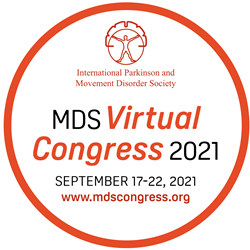
this is an important study because it shows a precision medicine approach to genetically determined PD
MILWAUKEE (PRWEB)
September 14, 2021
Mutations in the gene coding for the leucine-rich repeat kinase 2 protein (LRRK2) have been recognized as a risk factor for both familial and sporadic PD, according to a study being presented at the MDS Virtual Congress 2021. LRRK2 dysfunction has been reported to influence the accumulation of α-synuclein during Parkinson’s disease (PD) pathogenesis.
This study investigated LRRK2 inhibition within human cerebrospinal fluid with small molecule inhibitors (BIIB122/DNL151 and DNL201). Prior studies had demonstrated adequate peripheral target engagement and safety with these inhibitors, allowing for further investigation. Fraser et al. designed four double-blind, placebo-controlled studies that were conducted following either a 10-day or 28-day timeframe. Subjects consisted of healthy individuals and PD patients. Cerebrospinal fluid was collected from subjects at baseline and at the last day of dosing, where total LRRK2 was measured.
Andrew Siderowf, Professor of Neurology at University of Pennsylvania and Chief of the Movement Disorders Division in the Perelman School of Medicine, responded to this study, “this is an important study because it shows a precision medicine approach to genetically determined PD, based on LRRK2 inhibition, moving from the bench to bedside. The results show a dose-dependent reduction in LRRK2 activity by these two, closely related LRRK2 inhibitors, indicating target engagement relevant to the proposed patho-mechanism. The safety profile in this group of studies did not identify issues with pulmonary toxicity, which had been a pre-clinical concern. These findings should be verified in more long-term trials”.
The author of the study is employed by Biogen.
About the MDS Virtual Congress 2021: Meeting participants gather to learn the latest research findings and state-of-the-art treatment options in Movement Disorders, including Parkinson’s disease. Over 9,000 physicians, scientists and medical professionals from more than 100 countries will participate virtually to view over 30 hours of educational content and 1,300 scientific abstracts submitted by colleagues from around the world.
About the International Parkinson and Movement Disorder Society:
The International Parkinson and Movement Disorder Society (MDS), an international society of over 11,000 clinicians, scientists, and other healthcare professionals, is dedicated to improving patient care through education and research. For more information about MDS, visit http://www.movementdisorders.org.
Share article on social media or email:

